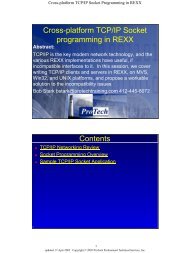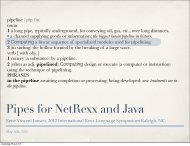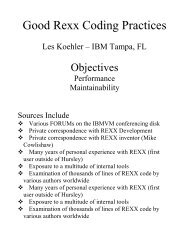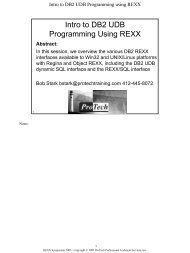Word Pro - DALLAS.LWP - The Rexx Language Association
Word Pro - DALLAS.LWP - The Rexx Language Association
Word Pro - DALLAS.LWP - The Rexx Language Association
You also want an ePaper? Increase the reach of your titles
YUMPU automatically turns print PDFs into web optimized ePapers that Google loves.
call var_value #Receiver, #IsA, '0'<br />
return #Outcome<br />
::method setmethod /* rSTRING oSTRING/METHOD/ARRAY */<br />
Adds a method to the receiver object's collection of object methods.<br />
Is 'object methods' what is intended; you add to a class without adding to its instance methods? Yes.<br />
if #ArgExists.2 then m = Arg.2<br />
else m = .NIL<br />
call set_var #Receiver, 'METHODS.'#Arg.1, '1', m<br />
return<br />
::method hasmethod /* rSTRING */<br />
Returns 1 (true) if the receiver object has a method with the specified name (translated to uppercase);<br />
otherwise, returns 0 (false).<br />
This presumably means inherited as well as SETMETHOD ones. What about ones set to .NIL?<br />
Need to use the same search as for sending.<br />
::method unsetmethod private<br />
Removes a method from the receiver object's collection of object methods.<br />
Use var_drop<br />
Private means Receiver = Self check.<br />
::method request /* rSTRING */<br />
Returns an object of the specified class, or the NIL object if the request cannot be satisfied.<br />
t = 'MAKE'#Arg.1<br />
if \#Receiver~hasmethod(t) then return .NIL<br />
forward message(t) array()<br />
::method run private /* rMETHOD Ugh keyoptions */<br />
Runs the specified method. <strong>The</strong> method has access to the object variables of the receiver object, just as<br />
if the receiver object had defined the method by using SETMETHOD.<br />
::method startat Undocumented?<br />
::method start /* rMESSAGE oArglist */<br />
Returns a message object and sends it a START message to start concurrent processing.<br />
::method init<br />
Performs any required object initialization.<br />
11.2.2 <strong>The</strong> class class<br />
::class class<br />
Lots of these methods are both class and instance. I don't know whether to list them twice.<br />
::method new class /* oARGLIST */<br />
Returns a new instance of the receiver class, whose object methods are the instance methods of the<br />
class. This method initializes a new instance by running its INIT methods.<br />
::method subclass class<br />
Returns a new subclass of the receiver class.<br />
::method subclasses class<br />
Returns the immediate subclasses of the receiver class in the form of a single-index array of the required<br />
size.<br />
::method define class /* rSTRING oMETHOD */<br />
Incorporates the method object in the receiver class's collection of instance methods. <strong>The</strong> method name<br />
is translated to upper case.<br />
::method delete<br />
Removes the receiver class's definition for the method name specified.<br />
Builtin classes cannot be altered.<br />
::method method class /* rSTRING */<br />
Returns the method object for the receiver class's definition for the method name given.<br />
Do we have to keep saying "method object" as opposed to "method" because "method name" exists?<br />
::method querymixinclass<br />
Returns 1 (true) if the class is a mixin class or 0 (false) otherwise.<br />
::method mixinclass class /* 3 of em */<br />
Returns a new mixin subclass of the receiver class.<br />
::method inherit class /* rCLASS oCLASS */<br />
132


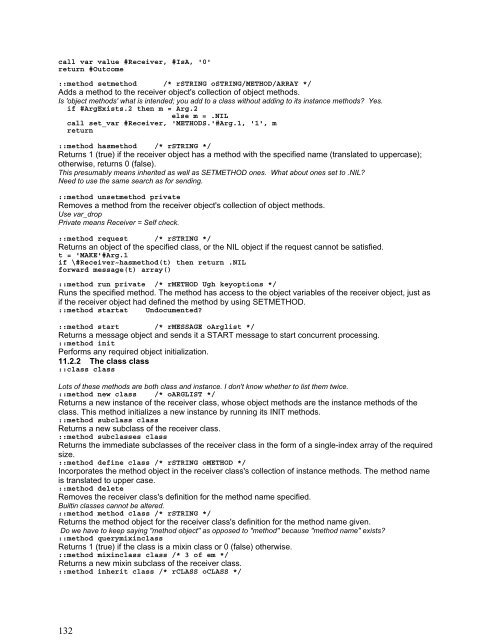
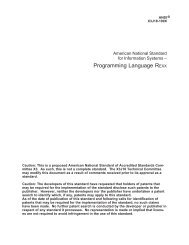
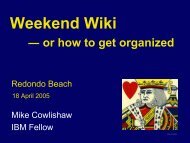
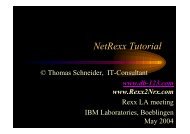
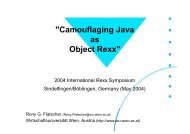

![Freelance Graphics - Parse[1].PRZ](https://img.yumpu.com/25741553/1/190x146/freelance-graphics-parse1prz.jpg?quality=85)


